February 19, 2021
Search Results for: collaboration
February 18, 2021
Four new companies join WorldGBC’s Net Zero Carbon Buildings Commitment
by Jayne Smith • Environment, News
 WorldGBC has announced four new companies as signatories to its Net Zero Carbon Buildings Commitment (the Commitment), signalling global industry leadership to decarbonise the built environment and combat climate change. The Commitment now has a total of 132 signatories, with 98 businesses & organisations, 28 cities and six states & regions. The businesses and organisations signed up to the Commitment now account for over 5 million (tCO2e) of portfolio emissions. (more…)
WorldGBC has announced four new companies as signatories to its Net Zero Carbon Buildings Commitment (the Commitment), signalling global industry leadership to decarbonise the built environment and combat climate change. The Commitment now has a total of 132 signatories, with 98 businesses & organisations, 28 cities and six states & regions. The businesses and organisations signed up to the Commitment now account for over 5 million (tCO2e) of portfolio emissions. (more…)
February 10, 2021
New Inverurie Community Campus features vast selection of KI seating
by Freddie Steele • Company news
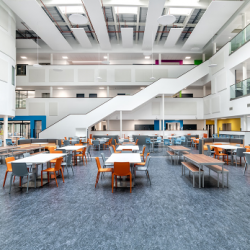 Opening its doors in late 2020, The Inverurie Community Campus in Aberdeenshire is a new £55m facility. One of the largest school constructions in Scotland, its 360 rooms accommodate 1,600 pupils and provides amenities such as a youth café, a community centre, and a swimming pool for students and the wider community. (more…)
Opening its doors in late 2020, The Inverurie Community Campus in Aberdeenshire is a new £55m facility. One of the largest school constructions in Scotland, its 360 rooms accommodate 1,600 pupils and provides amenities such as a youth café, a community centre, and a swimming pool for students and the wider community. (more…)
February 5, 2021
Remote working affects both ends of the career ladder
by Jayne Smith • News, Working lives
 Working together in person has far-ranging benefits on everything from mental health to economic growth according to a new report by Landsec and written by IC&CO and Honeycomb Analytics. The report, In Person: why coming together for work matters, includes interviews with business leaders and analysis of recent data to delve into topics including the ability for leaders to lead and the younger generation’s capacity to learn whilst remote working. (more…)
Working together in person has far-ranging benefits on everything from mental health to economic growth according to a new report by Landsec and written by IC&CO and Honeycomb Analytics. The report, In Person: why coming together for work matters, includes interviews with business leaders and analysis of recent data to delve into topics including the ability for leaders to lead and the younger generation’s capacity to learn whilst remote working. (more…)
February 5, 2021
Microsoft unveils new employee experience and wellbeing platform
by Freddie Steele • Company news, Technology, Wellbeing
 Microsoft has announced Microsoft Viva, which it claims is the first employee experience platform to bring tools for employee engagement, learning, wellbeing and knowledge discovery, directly into people’s workflow. Viva is designed to help employees ‘learn, grow and thrive’ in the new era of working life, and is designed to work alongside existing solutions such as Microsoft 365 and Microsoft Teams. (more…)
Microsoft has announced Microsoft Viva, which it claims is the first employee experience platform to bring tools for employee engagement, learning, wellbeing and knowledge discovery, directly into people’s workflow. Viva is designed to help employees ‘learn, grow and thrive’ in the new era of working life, and is designed to work alongside existing solutions such as Microsoft 365 and Microsoft Teams. (more…)
February 4, 2021
When business leaders open up about mental health, we all benefit
by Richard Goold • Comment, Wellbeing
 The Covid-19 pandemic has had an unprecedented effect on the way in which we work and has brought in to focus the challenges around mental health and wellbeing. The recognition that we are in the midst of the biggest mental health crisis since the Second World War brings the challenge in to stark focus. Time to Talk Day (today) aims to get the nation talking more openly about mental health, and there could not be a better time for it. Research from Wondrous published this week found that one in six people (17 percent) who have switched to remote working during the pandemic have seen their mental health suffer, rising to 20 percent among women and younger workers. I suspect that the inherent stigma that still surrounds mental health is masking the true percentage of people being affected. (more…)
The Covid-19 pandemic has had an unprecedented effect on the way in which we work and has brought in to focus the challenges around mental health and wellbeing. The recognition that we are in the midst of the biggest mental health crisis since the Second World War brings the challenge in to stark focus. Time to Talk Day (today) aims to get the nation talking more openly about mental health, and there could not be a better time for it. Research from Wondrous published this week found that one in six people (17 percent) who have switched to remote working during the pandemic have seen their mental health suffer, rising to 20 percent among women and younger workers. I suspect that the inherent stigma that still surrounds mental health is masking the true percentage of people being affected. (more…)
February 3, 2021
Amazon unveils latest plans for new US headquarters campus
by Neil Franklin • Architecture, Environment, News, Workplace design
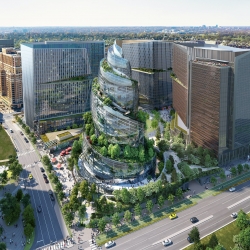 Amazon has submitted plans for its new $2.5 billion headquarters campus, known as HQ2, in Arlington County. Virginia. The NBBJ designed proposal for the PenPlace campus includes a 350 ft glass tower, three 22-story towers offering 2.8 million sq. ft of office space, a 250-seat outdoor amphitheatre, public green space, and several other buildings. The centre piece tower, officially dubbed The Helix, is a plant covered structure to emphasize the firm’s commitment to the environment and biophilic design. (more…)
Amazon has submitted plans for its new $2.5 billion headquarters campus, known as HQ2, in Arlington County. Virginia. The NBBJ designed proposal for the PenPlace campus includes a 350 ft glass tower, three 22-story towers offering 2.8 million sq. ft of office space, a 250-seat outdoor amphitheatre, public green space, and several other buildings. The centre piece tower, officially dubbed The Helix, is a plant covered structure to emphasize the firm’s commitment to the environment and biophilic design. (more…)
February 3, 2021
Be by Bisley reinvented for 2021
by Freddie Steele • Company news, Workplace design
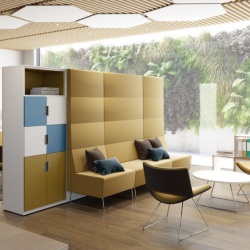 Be by Bisley was at the forefront of the agile working revolution when it first entered the market in 2012. Now, with nearly a decade’s worth of success behind it, Be has been rapidly reinvigorated for the post-Covid workspace’s demands, allowing distancing with creativity and design, while also considering safety with a heightened appreciation of wellbeing. (more…)
Be by Bisley was at the forefront of the agile working revolution when it first entered the market in 2012. Now, with nearly a decade’s worth of success behind it, Be has been rapidly reinvigorated for the post-Covid workspace’s demands, allowing distancing with creativity and design, while also considering safety with a heightened appreciation of wellbeing. (more…)
February 1, 2021
‘Make flexible working requests a day-one right’ says the CIPD
by Jayne Smith • Flexible working, News, Working lives
 Workers in Britain are facing inequality due to a stark difference in employers’ approaches to flexible working, with nearly half (46 percent) of employees saying they do not have flexible working arrangements – such as flexi-time, part-time working, compressed hours or job shares – in their current role. This is according to new research from the CIPD. (more…)
Workers in Britain are facing inequality due to a stark difference in employers’ approaches to flexible working, with nearly half (46 percent) of employees saying they do not have flexible working arrangements – such as flexi-time, part-time working, compressed hours or job shares – in their current role. This is according to new research from the CIPD. (more…)
January 28, 2021
Disconnected leadership hinders effective employee engagement
by Jayne Smith • Business, News, Working culture
 New research from Opinion Matters, commissioned by SocialChorus, the digital employee experience platform, claims that the digital employee experience (DEX) and employee engagement efforts by businesses across the US, UK and Nordics are hampered by the lack of collaboration between IT, HR and Internal Communications (IC) departments. (more…)
New research from Opinion Matters, commissioned by SocialChorus, the digital employee experience platform, claims that the digital employee experience (DEX) and employee engagement efforts by businesses across the US, UK and Nordics are hampered by the lack of collaboration between IT, HR and Internal Communications (IC) departments. (more…)
January 27, 2021
The lessons learned under the pandemic that will apply after it all ends
by Anna King • Features, Flexible working, Wellbeing, Workplace design
 Recently lighting control firm Prolojik assembled an expert panel to talk about learning and working during the time of the Covid-19 pandemic. The roundtable (online of course) involved participants from various fields related to the built environment including those involved in developing, designing and tech reflected on their own experiences over the last several months. While industry issues raised during the session included what productivity really means and how to measure it, what infrastructure needs to be in place to enable people to return to their place of work or education and why a joined-up approach to wellness is an indisputably necessary strand of building management. (more…)
Recently lighting control firm Prolojik assembled an expert panel to talk about learning and working during the time of the Covid-19 pandemic. The roundtable (online of course) involved participants from various fields related to the built environment including those involved in developing, designing and tech reflected on their own experiences over the last several months. While industry issues raised during the session included what productivity really means and how to measure it, what infrastructure needs to be in place to enable people to return to their place of work or education and why a joined-up approach to wellness is an indisputably necessary strand of building management. (more…)







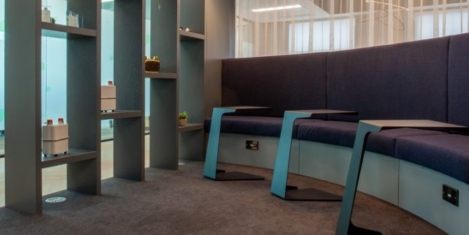
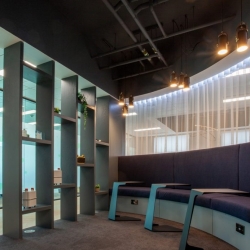 New data from real estate consultancy
New data from real estate consultancy 
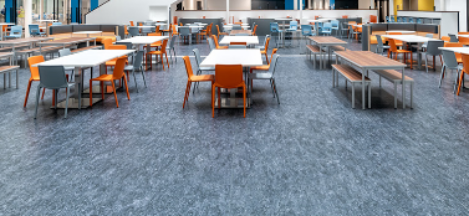

















February 5, 2021
Workplace things we have missed, and those we hope to regain
by Emma Morley • Comment, Technology, Wellbeing, Workplace design